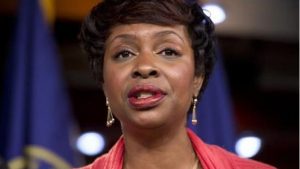
US Congresswoman Yvette D Clarke
NEW YORK, United States (CMC) — Caribbean American Congresswoman Yvette C Clarke has called on her colleagues in the United States House of Representatives and the Senate to join in an effort to restore former US President Barack Obama’s “practical, common-sense approach” towards Cuba.
Clarke, the daughter of Jamaican immigrants, who represents the 9th Congressional District in Brooklyn, New York, made the call as incumbent US President, Donald J Trump, announced last week that he would, among other things, limit travel by American citizens to Cuba and restrict financial transactions with many sectors of Cuba’s economy.
“President Obama worked to transcend past mistakes and build a future defined by the common interests and aspirations of the United States and Cuba,” Clarke told the Caribbean Media Corporation (CMC).
“Collaboration on issues such as family reunification, human rights, the interdiction of narcotics, and investment offer enormous benefits to the people of both nations. Now, Donald Trump wants to undermine those achievements, and turn toward a policy of mutual mistrust,” she added.
She said the “vast majority of Republicans and Democrats understand that the Cold War policy separating families and restricting economic development has outlived its usefulness.
“I urge my colleagues in the House of Representatives and the Senate to join in an effort to restore President Obama’s practical, common-sense approach,” Clarke said.
Over the weekend, another Caribbean American legislator described as “misguided” Trump’s new policy on Cuba.
New York State Assemblywoman Rodneyse Bichotte, the daughter of Haitian immigrants, told CMC that Trump’s decision to reverse some key elements of the Obama administration’s policies on opening up relations with Cuba is “not only misguided but resets the button that will take our new relationship with Cuba back to a relationship with resistance.”
Bichotte, who represents the 42nd Assembly District in Brooklyn, said that while Trump “purports to want to drive Cuba to do away with communism and embrace democracy, his actions would suggest otherwise.
“Instead, this policy reversal is more likely to drive Cuba toward allying with communist countries such as China and Russia,” she added.
“Although the reversal is not a complete reversal, for example, there will still be flights to and from Cuba, embassies will stay open, and Cuban-Americans will still be able to travel back and forth and send money to family members, Americans will no longer be able to plan their own private travel.
“Also, if traveling as part of an educational tour, Americans will have to undergo vetting to make sure they are not going there as tourists,” Bichotte continued. “In the end, the President is fulfilling a campaign promise to a small group of people, namely those Cubans in exile, who helped get him into office, but has yet to fulfill America’s promise.”
In an overhaul of one of his predecessor’s signature legacies, Trump last Friday re-drew US policy toward Cuba, tightening travel restrictions for Americans that had been loosened under Obama and banning US business transactions with Cuba’s vast military conglomerate.
Trump told buoyant supporters that he was “canceling completely” former Obama’s “one-sided deal with Cuba.”
But Christopher Sabatini, a professor at New York’s Columbia University School of International and Public Affairs, said the actual policy didn’t match the rhetoric in the theater.
“Many of the things that hardliners have denounced will seemingly remain in place,” he said, expressing surprise that Trump didn’t institute “a further rollback of the Obama opening, perhaps curtailing cruises to Cuba or restricting embassy operations.”
In fact, the Miami Herald said Trump’s new Cuba policy “left big chunks of the Obama policy of engagement intact, while instituting a policy designed to economically starve important Cuban military enterprises from cash they take in from American visitors and, to a lesser extent, US businesses.”
The Cuba Study Group, which comprises business executives and professionals who support engagement with Havana, said many of the gains of normalisation with the Spanish-speaking Caribbean country remain intact.
“At best, this is a partial victory for those who hoped to reverse increased bilateral ties,” said the group in a statement, urging full normalisation with Cuba.
“Restricting US travel isolates Cubans from knowledge of American political, economic, and human rights norms,” it added.
Trump’s policy retained the Obama-era’s travel opening for Americans, which allows them to visit Cuba if they fall into 12 categories of travel, such as family visits, and religious, humanitarian and educational trips.
The policy, however, eliminates the ability for Americans to pursue individual people-to-people educational trips.
But, while noting that Washington was in no position to be lecturing Havana on human rights, Cuba still extended an olive branch to the Trump administration.
“The government of Cuba reiterates its willingness to continue a respectful dialogue and cooperation on themes of mutual interest, as well as negotiations on pending bilateral matters, with the government of the United States,” said the Cuba government in an official statement.
